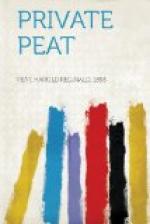Here, however, we did meet the French “fag.” When Tommy gets one puff of this article of combustion he never wants another. It is one puff too many. Of course our first race was to buy cigarettes—but, napoo!
Before entraining we were all shocked by the dreadful tidings that the transport carrying the Forty-Eighth Highlanders had been sunk. This news was soon discredited and the truth was established when the Forty-Eighth came up the line in a few days and reported that they had heard we, the Third, had been sunk and all drowned. Apparently it was a part of certain propaganda to publish that all transports of British soldiers were destroyed. So far none had even been attacked.
The evening of our arrival we boarded the little trains. To our surprise and to our intense disgust, we had not even the passenger coaches provided in England and Canada. I say little trains, because they were little, and in addition the coaches were not coaches, but box cars. Painted on the side of the “wheeled box” was “Huit chevaux par ordinaire.”
But these are not ordinary times, so instead of eight horses they put forty-eight of us boys in each car. Forty-eight boys all my size might have worked out well enough, though in full fighting trim even I was quite a husky, but the average Canadian soldier is a much bigger man. Take into consideration what we have to carry. There is our entrenching tool which we use for digging in. To look at it the uninitiated might well think that it was a toy, but, as I learned afterward, when bullets are flying around you by the thousand you can get into the ground with even a toy—or less.
There is our pack. A soldier’s pack on active service in the British Army is supposed to weigh approximately forty-five pounds, but when the average Tommy lands in France his pack weighs nearer seventy-five pounds than forty-five. Tommy does not feel like throwing away that extra pair of boots, two or three suits of extra underwear, and so many of the little things sent from home or given him just before setting out for France. As a consequence when he arrives in France he carries a very heavy load, though it does not stay heavy for long. After being on a route march or two the weight will mysteriously disappear. Then Tommy carries one pair of boots, one suit of underwear, one shirt, one pair of socks, and they are all on him.
There is a mess tin to cook in, wash in, shave in and do all manner of things with. There is the haversack in which is stuffed a three-day emergency ration. The emergency ration of the early days of the war was much different from the emergency ration of to-day. These rations are intended to be used only in an emergency, and, believe me, only in an emergency are they used. There was compressed beef—compressed air, we called it; there were Oxo cubes and there was tea. In addition there were a few hardtacks.
Then there is the bandoleer, and the soldier on active service in this war never carries less than one hundred and fifty rounds of ammunition at any one time, and sometimes he carries much more. As a final, there is our rifle and bayonet. At that time of which I am speaking we Canadians carried the now famous, or infamous, Ross rifle. This weighed nine and three-quarters pounds.




